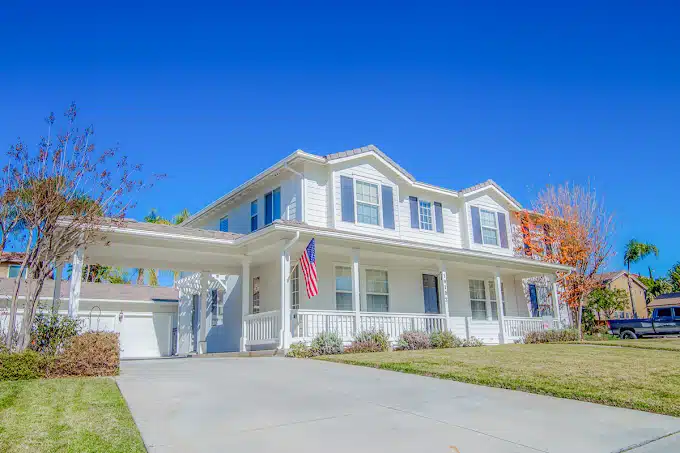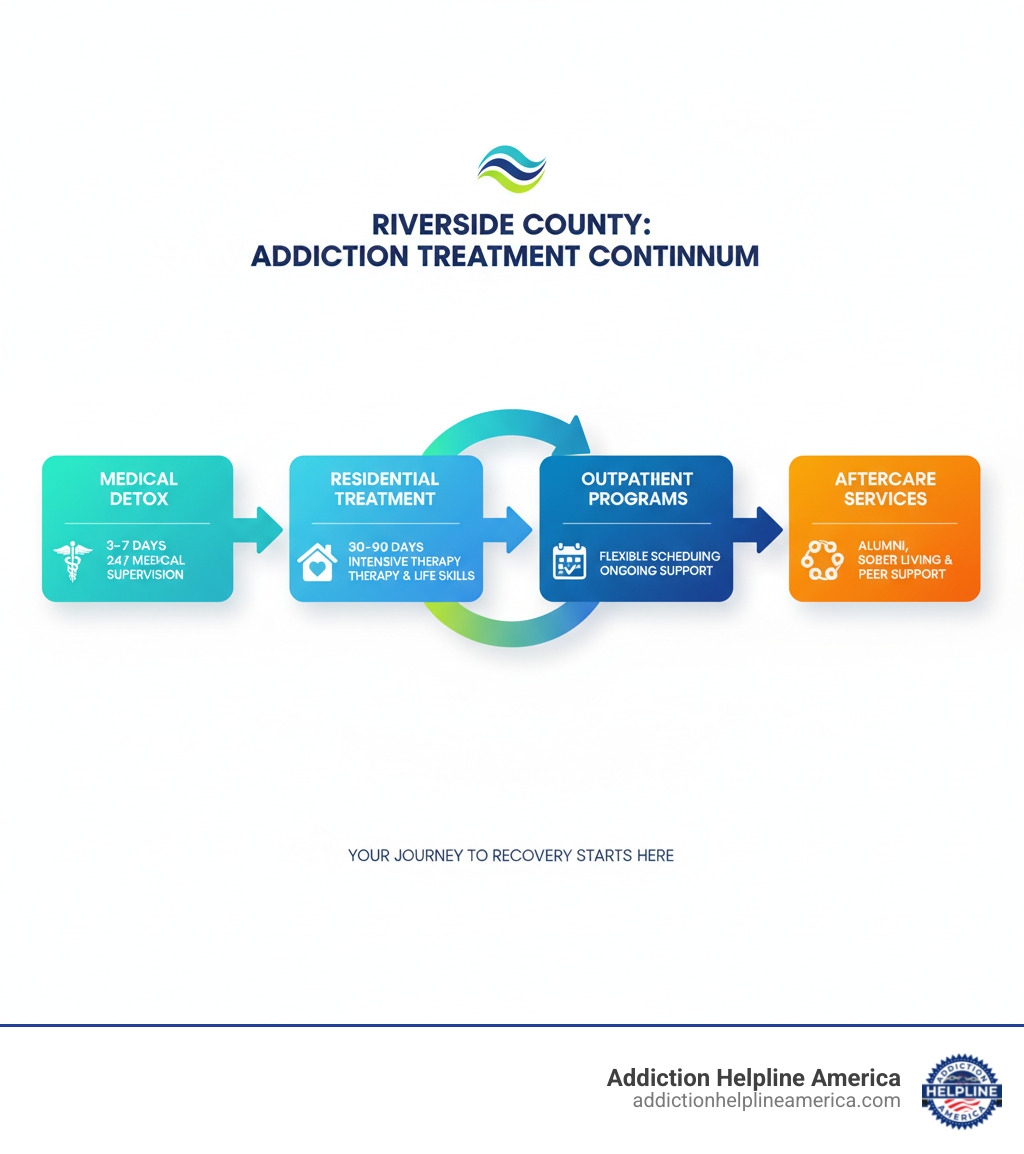
Why Finding the Right Rehab Center in Riverside County Could Save Your Life
Rehab centers in Riverside County offer critical lifesaving services during one of the most dangerous addiction crises the region has ever faced. With fentanyl-related deaths increasing by 800 percent over the last five years and over 500 deaths expected this year alone, finding immediate professional help has never been more urgent.
Quick Guide to Rehab Centers in Riverside County:
- 31 addiction treatment centers available in Riverside with various specialties
- Treatment types: Medical detox, inpatient residential, outpatient programs, dual diagnosis
- Major providers: MFI Recovery Center (4 locations), Everlast Recovery Center, Whiteside Manor
- Payment options: Most insurance accepted, Medi-Cal, sliding scale fees, financial assistance
- Specialized programs: Veterans, women with children, LGBTQ+, trauma-informed care
- Assessment hotline: (800) 499-3008 for Medi-Cal recipients
The good news? Recovery is absolutely possible with the right support and treatment approach. Whether you’re struggling with alcohol, opioids, methamphetamines, or co-occurring mental health conditions, Riverside County offers comprehensive treatment options designed to meet your specific needs.
From medical detox facilities that provide 24/7 supervision during withdrawal to residential programs that offer months of intensive therapy, the county’s treatment landscape includes everything from luxury amenities to completely free services for those who qualify.
At Addiction Helpline America, we’ve spent years connecting individuals and families with effective rehab centers in Riverside County and understand the unique challenges facing this community. Our team provides confidential guidance to help you steer treatment options and find the right path forward, regardless of your financial situation or insurance status.

Understanding the Addiction Crisis in Riverside County
The rolling hills and desert landscapes of Riverside County paint a picture of California beauty, but beneath the surface, families are fighting a battle that’s claiming lives at an unprecedented rate. The fentanyl crisis has hit this community harder than almost anywhere else, with deaths skyrocketing by 800 percent over just five years.
To put this in perspective: where Riverside County once saw dozens of overdose deaths annually, over 500 people are expected to lose their lives to fentanyl poisoning this year alone. These aren’t just statistics—they’re neighbors, parents, children, and friends whose lives were cut tragically short.
The community isn’t standing by quietly. Local advocates, healthcare workers, and families affected by addiction are pushing for stronger action against fentanyl distribution while demanding more treatment resources. Churches, schools, and community centers are hosting awareness events and naloxone training sessions. This grassroots response shows something powerful: when a community comes together, real change becomes possible.
The most important thing to understand is this: seeking help isn’t just about saving one life—it’s about protecting entire families and strengthening the whole community. Every person who enters treatment creates a ripple effect of healing that touches everyone around them.

The Alarming Rise of Fentanyl
That 800 percent increase isn’t a typo—it’s the harsh reality facing Riverside County families every single day. Fentanyl, a synthetic drug that’s 50 to 100 times stronger than morphine, has quietly infiltrated the local drug supply. The scariest part? Most people don’t even know they’re taking it.
What makes fentanyl so deadly is how it hides in other drugs. Someone might think they’re using heroin, prescription pills, or even cocaine, but fentanyl has been mixed in by dealers looking to make their products more potent and addictive. Just a tiny amount—equivalent to a few grains of salt—can be fatal.
County officials and public health leaders have launched aggressive initiatives to combat this crisis, including expanded naloxone distribution, public awareness campaigns, and increased funding for treatment programs. But here’s the truth: the most effective response happens when individuals and families reach out for help before it’s too late.
If you’re worried about yourself or someone you love, please don’t wait for tomorrow. The rehab centers in Riverside County are equipped to handle fentanyl addiction and withdrawal safely, with medical supervision that can literally save lives. Addiction Helpline America is here to provide confidential help and connect you with the right resources immediately.
The Role of Integrated Mental Health Services
Here’s something most people don’t realize: addiction rarely travels alone. In our experience connecting people with treatment, we’ve seen that most individuals struggling with substance use are also dealing with mental health challenges like anxiety, depression, PTSD, or trauma from past experiences.
This combination is called co-occurring disorders or dual diagnosis, and it’s incredibly common. Think about it—if someone is battling severe depression or anxiety, substances might seem like the only way to find relief, even temporarily. But treating just the addiction without addressing the underlying mental health issues is like putting a band-aid on a broken bone.
The best rehab centers in Riverside County understand this connection completely. They don’t just focus on getting someone sober; they treat the whole person, addressing both the addiction and the mental health conditions that often fuel it. This approach, called integrated treatment, gives people a much stronger foundation for lasting recovery.
Trauma-informed care has become especially important in Riverside County’s treatment landscape. Many facilities now recognize that unresolved trauma—whether from childhood experiences, military service, domestic violence, or other painful events—can be a major driver behind both addiction and mental health struggles.
By addressing these intertwined issues together, people in recovery get the comprehensive support they need to heal completely, not just temporarily. It’s the difference between managing symptoms and actually getting better.
A Guide to Rehab Centers in Riverside County: Treatment Types
Finding the right treatment can feel overwhelming when you’re already dealing with addiction. The good news is that rehab centers in Riverside County offer a wide range of options designed to meet you exactly where you are in your recovery journey. Think of it like finding the right key for a lock – there’s a treatment approach that fits your specific needs, circumstances, and goals.
The beauty of today’s addiction treatment is that it’s not a one-size-fits-all approach. Whether you need intensive medical supervision or flexible scheduling around work and family, there’s a program designed with your life in mind. From your very first day of detox to years of ongoing support, the treatment continuum creates a personalized roadmap for your recovery.

Medical Detox and Medication-Assisted Treatment (MAT)
Let’s be honest – detox can be scary. Your body has become dependent on substances, and when you stop using, withdrawal symptoms can range from uncomfortable to downright dangerous. That’s exactly why trying to detox at home is never a good idea. Professional medical detox provides the safety net you need during this critical first step.
At facilities like Hemet Valley Recovery Center, the Inland Empire’s only hospital-based addiction treatment center, you’ll have medical professionals monitoring you around the clock. They can manage withdrawal symptoms safely and make sure you’re as comfortable as possible during this challenging time.
Medication-Assisted Treatment (MAT) has revolutionized recovery, especially for opioid addiction. If you’re struggling with opioids, medications like buprenorphine and naltrexone can be game-changers. They help manage those intense cravings and withdrawal symptoms that make staying clean feel impossible.
MAT isn’t about replacing one drug with another – it’s about giving your brain time to heal while you learn new coping skills. Many rehab centers in Riverside County combine these medications with counseling and therapy, creating a comprehensive approach that addresses both the physical and emotional sides of addiction.
Inpatient vs. Outpatient Programs: What’s the Difference?
Choosing between inpatient and outpatient treatment is one of the biggest decisions you’ll make. Both can be incredibly effective, but they serve different needs and lifestyles.
| Feature | Inpatient (Residential) Treatment | Outpatient Treatment |
|---|---|---|
| Environment | 24/7 supervised, structured, drug-free facility | Live at home, attend sessions at a facility |
| Intensity | High, daily therapy, group sessions, activities | Moderate, scheduled sessions (e.g., 2-5 times a week) |
| Duration | Typically 30, 60, 90 days, or longer | Varies, from a few weeks to several months or longer |
| Ideal Candidate | Severe addiction, co-occurring disorders, need to escape triggers, unstable home environment | Stable home environment, less severe addiction, work/school/family commitments |
| Cost | Generally higher due to 24/7 care and amenities | Generally lower, more flexible |
Inpatient treatment means living at the facility for 30, 60, 90 days, or sometimes longer. It’s like hitting the reset button on your life. You’re completely removed from triggers, surrounded by support, and focused entirely on recovery. This intensive approach works best if you have a severe addiction, struggle with mental health issues alongside addiction, or if your home environment isn’t safe for recovery.
Outpatient programs let you live at home while attending regular therapy sessions. These include Intensive Outpatient Programs (IOP) and Partial Hospitalization Programs (PHP). If you have kids to care for, a job you can’t leave, or a strong support system at home, outpatient treatment might be perfect for you.
Places like MFI Recovery Center offer both residential and various outpatient options, so you can transition between levels of care as your needs change.
Specialized Programs for Diverse Needs
Here’s something beautiful about recovery today – treatment centers recognize that your background, experiences, and challenges matter. Rehab centers in Riverside County offer specialized programs that speak directly to who you are and what you’ve been through.
Men’s programs at facilities like Whiteside Manor and MFI Recovery Center’s Mt Rubidoux location create spaces where men can address issues like anger, relationships, and societal pressures without judgment. These programs understand that men often face unique barriers to seeking help and create environments where vulnerability is seen as strength.
Women’s programs recognize that women’s paths to addiction and recovery are often different. MFI Recovery Center’s “A Women’s Place” and ABC Recovery Center offer specialized care that addresses trauma, relationships, and family dynamics. They also provide perinatal programs for pregnant women and mothers, because addiction doesn’t pause for motherhood – and neither should treatment.
Adolescent care at MFI Recovery Center acknowledges that teenagers aren’t just small adults. Their brains are still developing, and they need treatment approaches designed for their unique developmental stage and social pressures.
Veterans programs at Everlast Recovery Center, Hemet Valley Recovery Center, and MFI Recovery Center’s Mt Rubidoux location understand that military service can create specific traumas and challenges. These programs are staffed by people who get what veterans have been through.
LGBTQ+ support is available at ABC Recovery Center and select MFI programs, creating safe spaces where individuals can be completely authentic about their identity while working on recovery.
Family therapy programs recognize that addiction affects entire families, not just individuals. Centers like MFI Recovery Center’s Woodcrest Facility help rebuild relationships and teach families how to support recovery without enabling addiction.
Trauma-informed care is crucial for anyone who’s experienced domestic violence, sexual abuse, or other trauma. Many centers offer specialized approaches like EMDR and Seeking Safety to address these deep wounds that often fuel addiction.
Whether you’re dealing with court referrals, mental health disorders, HIV/AIDS, chronic pain, or you’re a senior citizen, there’s likely a program designed with your specific needs in mind. This personalized approach means you’re not trying to fit into someone else’s recovery plan – you’re getting treatment that truly fits your life.
Navigating Cost, Insurance, and Accessibility
Let’s be honest—one of the first thoughts that crosses your mind when considering addiction treatment is probably “How much will this cost?” It’s a completely natural concern, and you’re not alone in feeling overwhelmed by potential expenses. The good news is that rehab centers in Riverside County have worked hard to make treatment accessible, regardless of your financial situation.
We’ve seen too many people delay getting help because they’re worried about money. But here’s what we want you to know: there are numerous payment options, insurance benefits, and assistance programs specifically designed to remove financial barriers from your path to recovery.

How Much Does Rehab Cost in Riverside?
Treatment costs in Riverside vary significantly based on what type of program you choose, how long you stay, and what amenities are included. A basic outpatient program will cost much less than a residential facility with private rooms and gourmet meals. But remember—the most expensive option isn’t automatically the best choice for your recovery.
Let’s look at some realistic numbers. Without insurance, residential treatment averaging about 3.25 months typically runs around $24,564 total, which breaks down to roughly $7,558 per month. If you have insurance covering 80% of costs, you’d pay approximately $4,913 total, or about $1,512 monthly.
Intensive outpatient programs lasting about three months average $10,633 without insurance (around $3,544 monthly). With 80% insurance coverage, your portion drops to approximately $2,127 total, or about $709 per month.
Standard outpatient treatment over 4.5 months costs roughly $6,035 without insurance ($1,341 monthly). With good insurance coverage, you’d pay around $1,207 total, which is only about $268 per month.
Methadone maintenance programs, which typically last nearly two years, total about $21,668 without insurance ($996 monthly). With insurance, your cost drops to approximately $4,334 total, or just $199 monthly.
These numbers show how dramatically insurance can reduce your financial burden, making treatment much more manageable than you might expect.
Finding Affordable Rehab Centers in Riverside County
If you’re uninsured or have limited income, don’t lose hope. Many facilities in Riverside County operate on the principle that everyone deserves recovery, regardless of their ability to pay. We’ve helped countless people find quality treatment at prices they can afford.
Government-funded programs often provide services at little to no cost if you meet certain residency and income requirements. The Salvation Army Adult Rehabilitation Center in Riverside, for instance, typically offers their comprehensive program at no charge to participants, focusing on both recovery and helping you get back on your feet professionally.
Medi-Cal recipients have a direct path to treatment. If you have Riverside County Medi-Cal and need detox or residential care, simply call (800) 499-3008 for your assessment. Many local centers accept Medi-Cal, making treatment accessible immediately.
Sliding scale fees adjust treatment costs based on your actual income, not some arbitrary number. About five programs within 10 miles of Riverside offer this option, meaning you pay what you can reasonably afford.
Payment assistance programs are available at roughly three facilities near Riverside. These might include direct financial aid, payment plans, or connections to other funding sources you hadn’t considered.
Non-profit treatment centers like MFI Recovery Center operate as 501(c)(3) organizations, meaning their mission focuses on providing care rather than generating profits. This commitment often translates into more flexible payment options and genuine efforts to work within your budget.
Using Insurance to Cover Treatment
Here’s some encouraging news: your health insurance likely covers more addiction treatment than you realize. Thanks to the Mental Health Parity and Addiction Equity Act, insurers must treat substance use disorder coverage the same way they handle other medical conditions.
Most rehab centers in Riverside County accept major insurance plans including Aetna, BlueCross BlueShield, Cigna, UnitedHealthcare, Medi-Cal, Medicare, and TRICARE. They also work with Health Net, Optum, Managed Health Network, Carelon Behavioral Health, Kaiser (sometimes out-of-network), MultiPlan, and Magellan.
The key is verifying your specific benefits before starting treatment. Many centers, like Everlast Recovery Center, will check your coverage for you and explain exactly what you’ll owe upfront. No surprises, no hidden fees.
Understanding your benefits doesn’t have to be confusing or stressful. Our team at Addiction Helpline America regularly helps people steer insurance questions and connect with in-network providers. We can walk you through your options and help you understand what your policy actually covers, making the whole process much clearer and less overwhelming.
How to Choose the Right Program and Ensure Lasting Recovery
Finding the right rehab centers in Riverside County isn’t about finding some mythical “perfect” facility. It’s about finding the treatment center that fits your unique situation, needs, and goals. Think of it like finding the right pair of shoes – what works perfectly for someone else might not be comfortable for you at all.
Making this decision can feel overwhelming, especially when you’re already dealing with so much. But taking the time to ask the right questions and understand what truly matters for long-term success can make all the difference in your recovery journey.
Questions to Ask When Choosing a Rehab Center
When you’re talking with potential treatment centers, don’t be shy about asking detailed questions. Any reputable facility will welcome your curiosity and provide clear, honest answers. Here are the key areas you’ll want to explore:
Treatment approaches and therapies should be at the top of your list. Ask what specific therapies they offer, looking for evidence-based options like Cognitive Behavioral Therapy (CBT) and Dialectical Behavior Therapy (DBT). Many quality centers also integrate holistic approaches like yoga, art therapy, and music therapy alongside traditional counseling.
Staff qualifications matter enormously, especially if you’re dealing with both addiction and mental health challenges. You’ll want to know if their team can effectively treat co-occurring disorders like anxiety, depression, or PTSD. The best programs have staff trained in dual diagnosis treatment who understand how these conditions interact.
Personalized treatment planning is crucial. Ask directly: “How do you customize treatment for each person?” Cookie-cutter programs rarely work as well as those custom to your specific circumstances, background, and recovery goals.
Family involvement can be a game-changer for many people in recovery. Find out what opportunities exist for family therapy and education. Centers like MFI Recovery Center, Everlast Recovery Center, and ABC Recovery Center all emphasize family programs because they know that healing relationships often supports lasting sobriety.
Medication-assisted treatment (MAT) availability is essential if you’re dealing with opioid addiction. Ask if they can provide medications like buprenorphine or naltrexone, and more importantly, whether they help you connect with community providers for ongoing medication management after treatment ends.
Don’t forget to ask about accreditations and licensing. Look for credentials from organizations like CARF (which accredits facilities like MFI Recovery Center and Whiteside Manor) or state licensing from California’s Department of Health Care Services. These aren’t just fancy certificates on the wall – they represent real standards of care and accountability.
Finally, request their patient rights and responsibilities in writing. Understanding the program’s structure, rules, and expectations helps you prepare mentally and practically for what lies ahead.
The Importance of Aftercare and Support Systems
Here’s something that might surprise you: the real work of recovery often begins after you complete a formal treatment program. That’s not meant to discourage you – it’s actually empowering to know that recovery is an ongoing journey with lots of support available along the way.
Relapse prevention strategies form the backbone of successful long-term recovery. The best rehab centers in Riverside County don’t just help you get sober; they teach you practical skills for navigating triggers, managing stress, and handling life’s inevitable challenges without turning to substances.
Alumni programs create lasting connections with people who truly understand your experience. Centers like ABC Recovery Center and the Salvation Army’s Adult Rehabilitation Center maintain active alumni networks that provide ongoing support, social events, and that invaluable sense of community among people who’ve walked similar paths.
Sober living homes like Oxford House offer a middle ground between intensive treatment and complete independence. These residences provide structure, accountability, and peer support while you rebuild your life skills and confidence.
Peer support groups such as Narcotics Anonymous, Alcoholics Anonymous, and SMART Recovery offer something that even the best professional treatment can’t: the wisdom and encouragement of people who’ve been exactly where you are. These groups are free, widely available, and provide accountability that can be life-saving during difficult moments.
Ongoing therapy and counseling helps you continue developing coping skills and processing new challenges as they arise. Life doesn’t pause for recovery, so having professional support available as you steer work stress, relationship changes, or family issues can prevent small problems from becoming big ones.
Family support and education often needs to continue long after treatment ends. Addiction affects entire families, and healing those relationships takes time, patience, and often professional guidance. Family therapy helps everyone learn healthier communication patterns and ways to support your recovery without enabling unhealthy behaviors.
The truth is, people who engage with multiple forms of aftercare tend to have much better long-term outcomes. It’s not about being dependent on support forever – it’s about building a strong foundation that allows you to live independently and confidently in recovery.
At Addiction Helpline America, we understand that choosing treatment is just the beginning. We’re here to help you find not just the right program, but also connect you with the ongoing resources that support lasting recovery in Riverside County and beyond.
Your Path to Recovery Starts Today
If you’re reading this, you’ve already taken one of the most important steps—recognizing that help is available and recovery is possible. The addiction crisis in Riverside County is real and devastating, but so is the hope that comes with finding the right treatment.
Recovery is absolutely possible. Thousands of people have walked this path before you and found their way to healthier, more fulfilling lives. The rehab centers in Riverside County we’ve discussed offer proven, evidence-based treatments that work. Whether you need medical detox, residential treatment, outpatient programs, or specialized care for co-occurring mental health conditions, there’s a program designed specifically for your situation.
You don’t have to figure this out alone. The treatment landscape can feel overwhelming—with different levels of care, insurance questions, and so many options to consider. That’s exactly why Addiction Helpline America exists. We provide free, confidential guidance to help you steer these choices and find the right recovery program that fits your unique needs and circumstances.
Maybe you’re worried about cost, or you’re not sure if your insurance will cover treatment. Perhaps you’re concerned about taking time away from work or family responsibilities. These are all valid concerns, and there are solutions for each of them. From Medi-Cal coverage to sliding scale fees, from outpatient programs that work around your schedule to family therapy that helps heal relationships—the options are there.
The first step is often the hardest, but it’s also the most courageous thing you can do. Recovery isn’t just about stopping substance use—it’s about reclaiming your life, rebuilding relationships, and refinding who you are without addiction controlling your choices.
Our team at Addiction Helpline America understands what you’re going through. We’re here to listen without judgment, answer your questions, address your concerns, and connect you with the resources that can make all the difference. Every call is completely confidential, and there’s never any pressure—just compassionate guidance from people who genuinely care about your recovery.
Your journey to recovery starts with a single phone call or click. Hope and healing are waiting for you in Riverside County, and we’re here to help you find them.
Our helpline is 100%
free & confidential
If you or someone you care about is struggling with drug or alcohol addiction, we can help you explore your recovery options. Don’t face this challenge alone—seek support from us.
Programs
Resources
Will my insurance
cover addiction
treatment?
We're ready to help
Find the best
drug or alcohol treatment
center
Are you or a loved one struggling with addiction? Call today to speak to a treatment expert.












